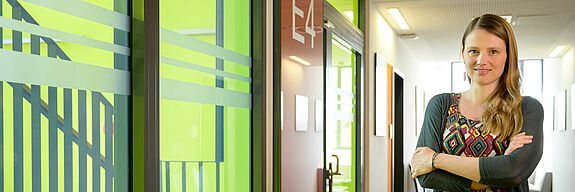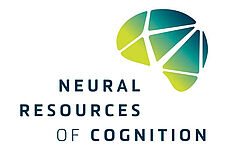Niklas Behrenbruch
I graduated from Goethe-Universität Frankfurt am Main with a B.Sc. in Physics and from Justus-Liebig-Universität Gießen with a B.Sc. in Psychology. Currently, I’m a Master’s student in integrative Neuroscience at the Otto-von-Guericke-Universität Magdeburg. My work focuses on cerebrovascular reactivity and resting-state functional magnetic resonance imaging-based metrics. In my thesis project, I apply these metrics to a cohort of Alzheimer’s disease patients. Outside the lab, I enjoy doing sports and playing tabletop or computer games with my friends.
Larissa Fischer
I am a PhD student in the research training group 2413 SynAGE, which conducts interdisciplinary research on healthy neurocognitive ageing. In my project, we use MR imaging to investigate altered memory-related activation and connectivity when we get older. We want to better understand the transformation of memory processes with age and distinguish it from pathological neurodegeneration.
In autumn 2022, I received my master's degree in psychology with distinction in the field of cognitive neuroscience from Otto von Guericke University of Magdeburg. During my studies, I gained experience with MR-based memory experiments at the department of behavioural neurology at the Leibniz Institute for Neurobiology in Magdeburg and during a research stay at the University of Cambridge. I am a volunteer paramedic and enjoy giving first aid trainings, I also love to eat blueberry ice cream.
Dr. Berta García-García
Did someone say Nuclear Medicine? As a physician working both in the clinic and in research, being formally in love with neuroplasticity, I gladly provide radioactive-based in vivo brain imaging. My current work takes place at the DZNE Magdeburg as well as in the Clinic for Radiology & Nuclear Medicine at the Universitätsklinikum, and mainly consists of performing PET/MR or PET/CT studies with different radiotracers to investigate the normal course of neurodegenerative diseases, what healthy aging means, as well as the functional effects of potential disease-modifying strategies.
Dr. Dayana Hayek
I come from Lebanon where I did my Bachelor in General Biology and a Masters in Cell and Molecular Biology. During my Masters, my research focus was on stem cells in the animal brain. After finishing my Masters, I got a scholarship from Germany to pursue my PhD in what was the most interesting for me: Cognitive Neuroscience from Greifswald University. There, I aimed to elucidate the neural correlates associated with memory decline using structural and functional neuroimaging and neuromodulation with transcranial direct current stimulation (tDCS). I am currently a postdoctoral researcher in “Deutsches Zentrum für Neurodegenerative Erkankungen” (DZNE) and Otto-von-Guericke University Magdeburg, Germany. My current research interests include: 1) inflammatory signatures and their relation to preserved or diminished brain structure and cognition, 2) Effects of hippocampal vascularization patterns on the structural changes at the meso-scale, and on the functional representations in the hippocampus.
Panagiotis Iliopoulos
I am Ph.D. Student at the University Clinic of Magdeburg since September 2021, after completing my M.Sc. studies in Cognitive Neuroscience at the LMU Munich University with a focus on neuroimaging, episodic memory, and cognitive control. I am intrigued by how our brain supports memory, including brain areas in the medial temporal lobe and beyond, and how this changes due to aging, disease, and interventions such as cognitive training.
A key aim of my Ph.D. is to investigate the neural resources of mnemonic discrimination and its potential for plasticity due to cognitive training, with the ultimate goal to promote interventions that could enhance cognitive performance. In this context, I work on the SFB1436 B02 project focused on web-based mnemonic discrimination training and its effect on cognition, neural function and structure. In my freetime, I like to do sports, play basketball and read.
Jonas Marquardt
After my bachelor’s in psychology at the Frei Universität Berlin, I decided to expand my special interest in cognitive neuroscience in a corresponding master’s program at the Friedrich-Schiller University Jena. Due to my great passion for neuroscience research, I have been doing my PhD in the CRC "Neural Resources of Cognition" in project B04 since May 2021. The main focus of my work is to develop a training study aimed at improving spatial navigation in the real world. Brain areas that are first affected by neurodegenerative changes in the context of Alzheimer's disease are also involved in spatial navigation ability, rendering it a promising cognitive ability to investigate or protect against early neurodegenerative changes.
Dr. Eóin Molloy
I am a cognitive neuroscientist at the MuMoNi Lab and the Faculty of Medicine at OvGU. Having earned my PhD at the MPI for Human Cognitive & Brain Sciences, my research is focused on using multimodal neuroimaging techniques (fMRI/PET) to characterise the molecular and functional characteristics of successful ageing, with an emphasis on the treatment and prevention of Alzheimer's disease. I am addressing this quesiton with my research on the neural resoureces of SuperAgers, and the open source PREVENT-AD dataset to investigate the neural characteristics of pre-symptomatic Alzheimer's disease. Outside the lab, you'll find me walking my dog, plane spotting, and supporting Manchester United.
Beate Schumann-Werner
Some things are hard to swallow, and that’s where I come in: As a trained speech-language therapist, my clinical and research interests mainly focus on the diagnosis and treatment of swallowing disorders associated with neurodegenerative diseases, but also disturbances of communication. To do that, I use instrumental swallowing examinations like fiberoptic endoscopic evaluation of swallowing (FEES), comparing that to brain patterns from neuroimaging techniques like (f)MRI. As I am also well versed in coordinating large observational studies, I am now part of the central project “Human molecular imaging ageing and SuperAgeing cohort” of the CRC 1436. In my free time, I enjoy hiking, travelling, baking, and practicing yoga.
Niklas Vockert
With a background in mathematical and computational modeling of biological processes and systems I joined the lab in August 2019 to learn more about the arguably most fascinating organ: the brain. Nowadays, I generally investigate reserve (e.g. cognitive reserve, resistance, resilience) in the context of aging and brain disease with multimodal neuroimaging techniques. For the most part my focus lies on the relationship between hippocampal vascularization and behavioral measures as well as structural and functional brain measures. In my free time I like to spend time in nature and am a sports and (board) game enthusiast.


